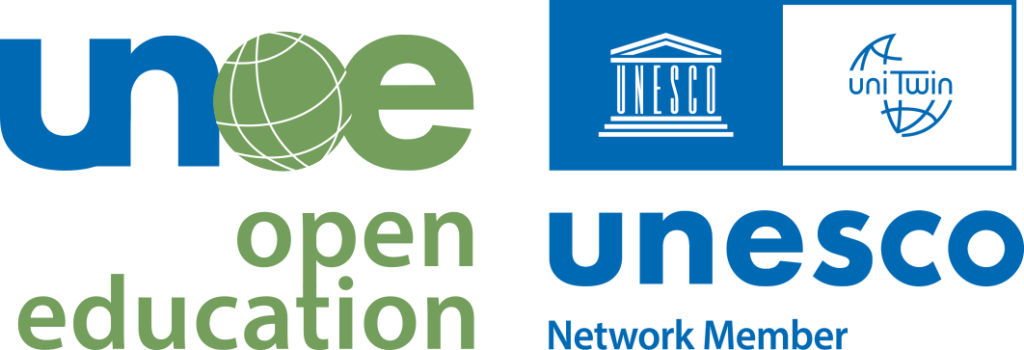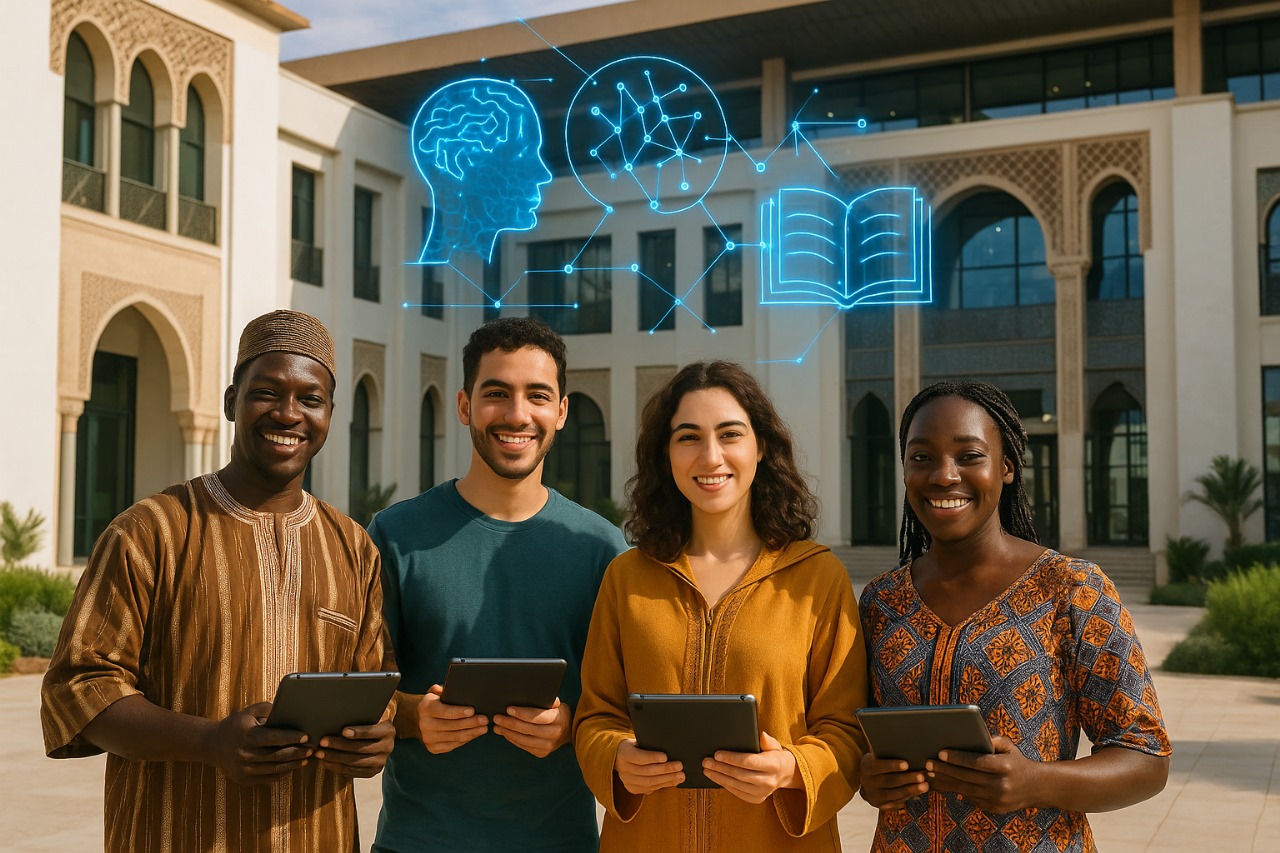We are pleased to share the work carried out in Morocco by Pr. Loubna Terhzaz, Pr. Latifa Chahbi & Pr. Khalid Berrada from ICESCO Chair on Open Education of Mohammed V University of Rabat with their students.
Here is their contribution to the UNOE Students Project: Why Do We Learn Today ?
AI Meets Open Education: Students Share Their Voices
In an era where access to knowledge must go beyond traditional boundaries, open education stands out as an inclusive model designed to offer resources and learning opportunities that are available to everyone, anytime and anywhere. At the same time, artificial intelligence (AI) is transforming teaching methods by providing tools that can adapt to each learner’s individual needs and enhance educational practices.
The UNOE blog, was created to give students a platform to express their thoughts, share experiences, and raise questions about the convergence of open education and AI. Within the framework of ICESCO open education chair, a member UNESCO UniTwin UNOE Network, students from Mohammed V University in Rabat and Abdelmalek Essaâdi University in Tetouan, Morocco were enthusiastically involved in this blog and expressed their thoughts.
These discussions allow us to explore how AI is already reshaping open educational practices while addressing important questions: How are these technologies changing the way we teach and learn? What effects do they have on students’ academic journeys and skill development?
Through their contributions, Bachelor, masters and PhD students actively engage in a collective reflection essential to envisioning a more inclusive, innovative education system that meets the challenges of the 21st century. Moreover, our student Abdou El Hadem EL HAFIDI created a chatBot that can be alimented by different sources related for example to Open education and that can be used for answering relevant questions.

Reimagining the Humanities in the Age of Artificial Intelligence:
Towards a Critical and Ethically-Governed Model for Open Education
By: Abdou El Hadem EL HAFIDI, Master student, Abdelmalek Essaâdi University in Tetouan, Morocco
In the current context marked by the rapid expansion of generative artificial intelligence, open education is confronted with a complex dual imperative: to ensure broad and equitable access to knowledge, while safeguarding the epistemological and ethical integrity of academic formation—particularly within the humanities. A discipline rooted in interpretative depth, theoretical plurality, and contextual nuance now finds itself challenged by algorithmic tools that, despite their computational prowess, tend to flatten intellectual complexity and normalize oversimplified forms of discourse.
Generative AI systems such as ChatGPT offer an unprecedented gateway to vast information networks. However, within an open educational paradigm—where learners often operate autonomously and outside the structures of guided instruction—such tools risk becoming substitutes for critical inquiry. They frequently provide immediate, generalized answers devoid of verifiable sources, historical grounding, or methodological transparency. In the realm of the humanities, this dynamic threatens to instrumentalize knowledge and erode the core practices of slow reading, comparative reasoning, and dialogical engagement.
The ethical ramifications of this shift are equally significant. The uncritical assimilation of non-peer-reviewed content, potential violations of intellectual property, and the reinforcement of cultural and linguistic biases embedded in training corpora all pose serious concerns. Furthermore, pedagogical observations increasingly reveal a tendency among students to rely on these tools at the expense of sustained intellectual effort, fostering a culture of passive consumption rather than active scholarly cultivation.
In response to these challenges, we advocate for a new conceptual and technical framework: an Ethical Research Companion—a generative system designed not to supplant the researcher, but to support their process with academic integrity and epistemological discernment. This model is anchored in a strict reliance on peer-reviewed, licensed sources, processed through platforms such as ChatPDF, and systematically referenced with full bibliographic metadata. Rather than offering singular or monolithic answers, the system is programmed to retrieve and juxtapose multiple theoretical perspectives when addressing contested questions, thereby encouraging reflexive and pluralistic modes of reasoning.
A pilot study conducted in the field of literary theory illustrates the potential of this approach. In response to the question, who determines the meaning of a text: the author or the reader? the system did not seek to resolve the debate, but instead contrasted Roland Barthes’s notion of the “death of the author” with Wolfgang Iser’s theory of the “implied reader”, situating each within its philosophical context and mapping the tensions that structure their divergence. This method not only preserved theoretical complexity but reinforced the pedagogical value of critical comparison. (http://openedvoices.com/WBOpenEdVoices)
Positioned within the framework of open education, such a tool embodies an alternative vision of human-machine interaction—one that resists epistemic reductionism and upholds the values of scholarly accountability. The aim is not increased automation, but a recalibration of digital tools in the service of critical thought, ethical reflexivity, and dialogic inquiry. In this sense, artificial intelligence, when embedded in principled design, can act not as a replacement for humanistic thinking, but as a mediator between contemporary learners and the accumulated wisdom of the intellectual tradition.
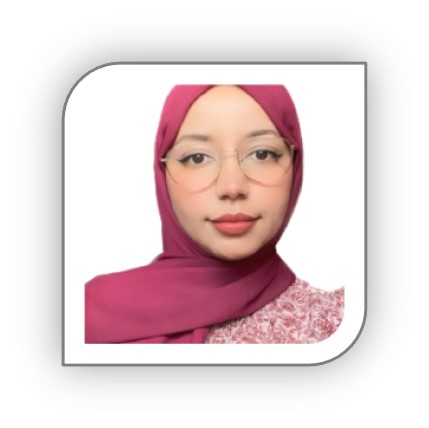
Open Education and Artificial Intelligence (AI): Two Fundamental Pillars for Advancing Education
By: Salma REGRAGUI, PhD Student, Mohammed V University in Rabat
Open education and artificial intelligence (AI) are now two fundamental pillars for advancing education. Open education refers to a world where access to knowledge is free and without borders, made possible through online courses, open educational resources, and freely accessible platforms.
This concept aims to share knowledge equitably, so that everyone has an equal opportunity to learn and contribute, without any barriers.
Open education, alongside artificial intelligence, forms two highly important pillars in contemporary education. AI complements open education by providing learning support tools, such as facilitating essential tasks in professional or scientific writing: text rephrasing, content summarization, automatic grammar and spelling correction, plagiarism detection, and machine translation of texts and entire documents—thereby eliminating language as a barrier to learning. Together, they create a powerful learning system tailored to everyone’s needs.
In my view, open education and AI, along with their integration, are crucial in today’s education system, especially for a generation that relies on the automation of essential life functions.
In my academic life, AI has been—and continues to be—an essential tool that helps me streamline many tasks, allowing me to save time and make faster progress in my scientific work. Similarly, open education resources enable me, as a PhD student, to deepen my understanding of my research topic and connect with international scientific networks.
From my perspective, AI is also essential even for younger students in their learning journey. It can support rapid progress, provided it is used alongside traditional teaching, with appropriate guidance and supervision.
The integration of artificial intelligence and open education in learning is, in my opinion, highly beneficial in making education more equitable and better suited to individual needs—provided it is used rigorously and responsibly. AI must remain a complementary tool that supports and enhances the learning process, without ever replacing or overshadowing the human dimension.
This article was originally written in French and translated with the help of artificial intelligence.

Open Education in the Age of Artificial Intelligence: The Future of Learning
By: Abdennour LAMHARCHI, PhD Student, Mohammed V University in Rabat
Open education is a fundamental educational phenomenon that aims to make learning—and knowledge itself—more accessible to all. It is an educational philosophy rooted in sharing, collaboration, and innovation in teaching practices.
Today’s world is undergoing accelerated technological development, and educational systems are being called upon to renew and update their strategic visions in order to improve the quality of education and foster skills development through digital tools.
The emergence of artificial intelligence as an advanced educational technology promises to revolutionize access to knowledge, the personalization of learning, and the effectiveness of pedagogical methods.
Artificial Intelligence Serving Open Education
Artificial intelligence (AI) acts as a transformative tool in realizing the principles of open education.First, in the area of participatory and collaborative learning, AI can facilitate and enhance educational practices aligned with socio-constructivist approaches. For instance, certain tools can analyze interactions within discussion forums or group projects to evaluate the quality of collaboration.
AI also has a more direct impact on the personalization and flexibility of learning. It enables adaptive learning paths by assessing learners’ knowledge levels, difficulties, and preferences, and then offering customized learning trajectories using available open resources (McFarland, 2025).
Beyond Technology: Ensuring Responsible Use to Support Open Education
In a world increasingly shaped by digital expansion, technology alone is not enough to ensure its effective use in education. A responsible approach is essential for AI to truly benefit open education. The first step is to ensure technological access, which depends heavily on educational administrations. This means addressing the digital divide—not only by providing tools and internet access but also by implementing human pedagogical support for learners who struggle to adapt to these technologies. As for responsible use by learners, it is crucial that they understand AI’s role as a tool to support and facilitate learning, not as a means for cheating or plagiarism.
Developing Digital Citizenship in the Age of AI
Digital citizenship refers to the ability to navigate digital environments responsibly and to engage meaningfully within technological spaces (Greffet & Wojcik, 2014). An AI-era citizen is someone who understands their role and responsibilities in an AI-driven future and commits to using these tools responsibly for the greater good of humanity.
Open education and educational technologies complement each other in shaping the future of learning. AI, as a continuously evolving tool, holds the promise of making knowledge more accessible and more personalized. However, to maximize its benefits, its responsible use is essential—just as the development of digital citizenship is vital to enable learners to fully harness these technological advances.
References :
- Greffet, F., & Wojcik, S. (2014). La citoyenneté numérique.
- McFarland, A. (2025). 10 meilleurs outils d’IA pour l’éducation. Consulté le 7 8, 2025, sur https://www.unite.ai/fr/10-best-ai-tools-for-education/
This article was originally written in French and translated with the help of artificial intelligence.
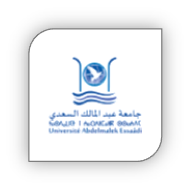
Open Education and Artificial Intelligence:
Unlocking New Horizons for Learning
By: Ikram SERREJ, Master student, Abdelmalek Essaâdi University in Tetouan, Morocco
In today’s rapidly evolving educational landscape, the use of Open Educational Resources (OER) is essential to ensure valid, high-quality, and accessible learning materials for everyone. OER not only guarantee fair use through Creative Commons licenses but also empower learners and educators by enabling the 5Rs: retention, reuse, revision, remix, and redistribution. These principles allow anyone—whether a student, teacher, developer, or lifelong learner—to access, adapt, and share knowledge freely and fairly.
The variety of OER is impressive, ranging from software and audiobooks to videos, podcasts, research publications, and full courses. This diversity ensures that learning can be personalized, inclusive, and available to all, regardless of background, ability, or circumstances.
One of UNESCO’s key recommendations for OER is the development of supportive policies. In this context, Artificial Intelligence (AI) plays a transformative role by accelerating comprehension, simplifying complex information, and fostering personal growth. AI acts as a powerful tool to innovate education and improve accessibility.
By combining OER and AI, we create an inspiring environment that encourages creativity, enhances research outcomes, and reduces the time, effort, and financial barriers often faced by learners and educators. Thanks to open licenses, resources remain free and easy to use, breaking down obstacles and opening doors to advanced educational development and better quality of life.
In my experience, embracing both open education and AI is a promising path toward a more inclusive, innovative, and accessible future for learning worldwide.
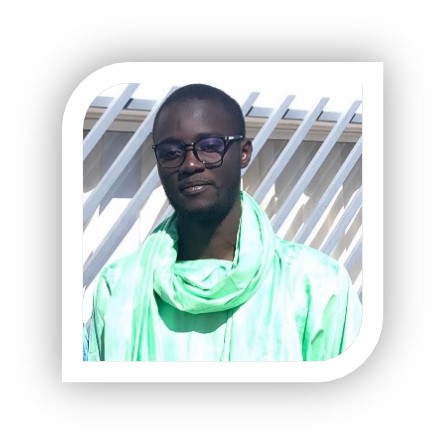
Artificial Intelligence:
A Key to Open Education
By: Cheikh Mourtala BOUSSO, Master student, Abdelmalek Essaâdi University in Tetouan, Morocco
As a student in the Master’s program in Religions and Civilizational Dialogue, I have discovered that artificial intelligence is not merely a technological advancement but a true driving force to enrich open education, especially in fields as sensitive and complex as intercultural and interreligious dialogue.
AI, through tools like ChatGPT or Manus AI, offers us quick and personalized access to a vast range of knowledge. It helps us better understand religious texts, analyse ideas, and explore civilizational concepts with new depth. This not only facilitates our learning but also strengthens our critical thinking by guiding us through sometimes challenging questions.
Within the framework of open education, this technology encourages autonomy and initiative: we become active participants in our knowledge by interacting directly with AI according to our needs. However, I have also learned that it is essential to master how to communicate with it, through “prompt engineering,” to obtain relevant and appropriate responses.
It is equally important to use AI ethically. In our field, where respect, nuance, and intellectual creativity are paramount, AI must remain a supportive tool, never a substitute. It can make mistakes or oversimplify complex realities.
For me, artificial intelligence opens a new path for open education, where knowledge and dialogue intersect, enabling us to build a more understanding and peaceful future between cultures and religions. It is an exciting challenge that we, as students, must approach with curiosity and responsibility.
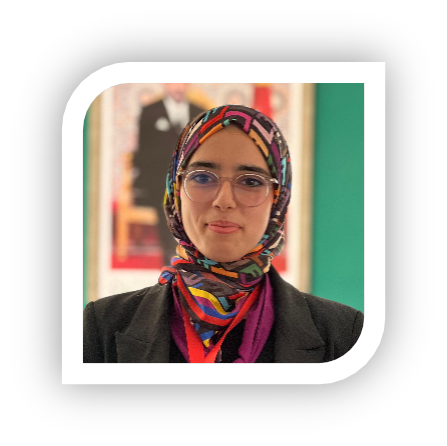
Bridging the Digital Divide:
Making AI a Tool for All in Open Education
By: Halima M’ÂACHOU, Bachelor student, Abdelmalek Essaâdi University in Tetouan, Morocco
We often hear that artificial intelligence is reshaping the future of education. But can it truly transform learning for everyone, everywhere, or only for those who can afford it?
As new AI tools continue to emerge at lightning speed, it’s tempting to imagine a future where machines support teachers, personalize learning, and make knowledge more accessible. But there’s a critical reality we can’t ignore: not all students—or educators—have equal access to these technologies.
In many regions, basic infrastructure is still lacking. Poor internet connectivity, frequent power outages, and the high cost of devices like smartphones and laptops are just some of the barriers that prevent learners from fully participating in the digital age. Meanwhile, educational institutions struggle to keep pace, caught between the pressure to innovate and the challenge of staying inclusive.
If we want AI to truly support the mission of open education, we must start by closing this digital gap. That means investing in infrastructure, training teachers, and designing smart, adaptable strategies that reflect the realities on the ground. Otherwise, AI risks becoming another tool that deepens inequality rather than a force that opens up new opportunities.
In the end, AI should not be a luxury. It should be a shared resource, an open door to knowledge, not a locked gate.

Artificial Intelligence and Open Education in Higher Learning:
Toward a Renewed Educational Model
By: Abdelaziz El FAGHLOUMI, Master student, Abdelmalek Essaâdi University in Tetouan, Morocco
Higher education is undergoing rapid transformation driven by technological advancement, with artificial intelligence (AI) emerging as a major force reshaping learning method, teaching practices, and modes of interaction within universities. In this context, open education has become a strategic option for institutions seeking to broaden access to knowledge and promote greater equity in learning opportunities.
AI technologies support open education on several levels. Through learning analytics, personalized learning paths can be developed to match the individual needs and varying levels of students. These technologies also enable the creation of educational platforms offering interactive content, real-time assessments, and continuous support for distance learners.
In this way, AI presents new opportunities for enhancing the quality of university-level education by facilitating access to resources, offering multilingual support tools, and overcoming geographical and temporal barriers. This aligns closely with the core goals of open education, particularly in fostering autonomous and self-paced learning and empowering students to develop digital and academic skills flexibly.
However, the integration of AI and open education in higher learning also raises several challenges, including the need for pedagogical frameworks that guide the ethical and critical use of such tools, avoiding overreliance on automation, and maintaining the human dimension of education—especially through the role of instructors and meaningful pedagogical interaction.
Developing this model requires a clear vision, one that balances the benefits of AI with a commitment to educational quality, responsibility, and critical thinking. In doing so, universities can embrace the digital shift while preserving the essential intellectual and human values of education.
“
Why Do We Learn Today? Insights from Moroccan Students
” by Pr. Loubna Terhzaz, Pr. Latifa Chahbi & Pr. Khalid Berrada and their students is licensed under CC BY 4.0
